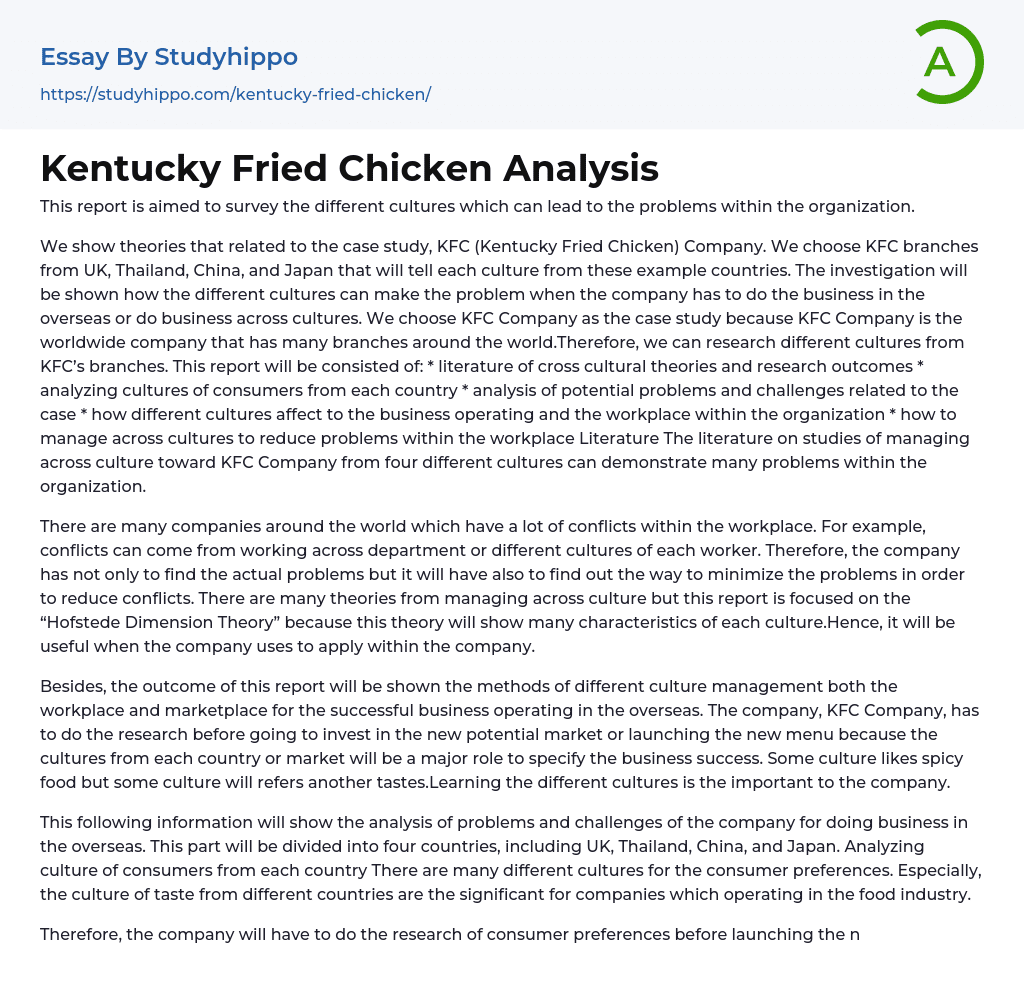The objective of this report is to examine various cultures that may result in issues within the company.
This report delves into cross-cultural theories and their relevance to the case study of KFC (Kentucky Fried Chicken) Company. The investigation focuses on KFC branches in the UK, Thailand, China, and Japan, which represent distinct cultural contexts. By examining different cultures from KFC's global branches, we aim to identify potential problems and challenges encountered by companies operating abroad or across cultures. The choice of KFC Company as a case study is fitting given its global presence. The report covers various aspects, including literature on cross-cultural theories and research outcomes, cultural analysis of consumers from each country, potential difficulties arising from the case, the impact of different cultures on business operations and workplace environments, and management strategies for mitigating workplace issues created by cross-cultu
...ral differences. Overall, this report examines numerous organizational issues related to managing across cultures in KFC Company, drawing on available literature to highlight key areas of concern for this prominent global franchise.
The workplace of many companies worldwide is often plagued by numerous conflicts. These conflicts may arise due to the differences in departmental functioning or due to cultural disparities between workers. Identifying the root cause of these conflicts is vital for companies to minimize issues that lead to confrontations. One of the more prominent theories for managing cultural differences is the Hofstede Dimension Theory. This theory thoroughly analyzes cultural characteristics and can be highly beneficial when implemented in the workplace environment.
Furthermore, the report will illustrate various approaches to cultural management in both workplace and marketplace for successful overseas business operations. It is imperative for
KFC Company to conduct research prior to investing in new markets or launching new menus, as cultural preferences play a crucial role in determining business success. While some cultures prefer spicy food, others may have different tastes. Therefore, understanding and learning about diverse cultures is paramount for the company.
The subsequent data will present an evaluation of the issues and obstacles the enterprise faces when conducting business abroad. The analysis will be separated into four nations: the UK, Thailand, China, and Japan. The exploration will involve a study of the consumer culture in each country. In particular, the diverse cultures influence the consumers' tastes significantly, which is crucial for food industry corporations.
Thus, to avoid errors, conducting research on consumer preferences is essential prior to introducing a new product to a new market. KFC is a prime illustration of this approach, as the company strives to understand the local culture of each country where it operates, adapting its menus accordingly. To determine the prevalent taste in each country, the company conducts surveys or research on consumer preference in each location, which helps it identify the appropriate menus for each country.
- Food Safety essays
- Food Security essays
- Beverages essays
- Cuisines essays
- Dairy essays
- Desserts essays
- Fast Food essays
- Bread essays
- Meal essays
- Meat essays
- Organic Food essays
- Rice essays
- Sugar essays
- Taste essays
- Beef essays
- Coconut essays
- Crowd essays
- Dinner essays
- Juice essays
- Sainsbury essays
- Cooking essays
- Ginger essays
- Oreo essays
- Drink essays
- Beer essays
- Wine essays
- Coffee essays
- Tea essays
- Cake essays
- Hamburger essays
- Ice Cream essays
- Burger essays
- Pizza essays
- Fruit essays
- Lemon essays
- Food Waste essays
- Favorite Food essays
- Alcoholic essays
- Soft Drinks essays
- Cookie essays
- Starch essays
- Yeast essays
- Cola essays
- Pizza Hut essays
- snack foods essays
- chips essays
- Biscuit essays
- Brewing essays
- Brewery essays
- Adaptation essays




